- Главная
- Разное
- Бизнес и предпринимательство
- Образование
- Развлечения
- Государство
- Спорт
- Графика
- Культурология
- Еда и кулинария
- Лингвистика
- Религиоведение
- Черчение
- Физкультура
- ИЗО
- Психология
- Социология
- Английский язык
- Астрономия
- Алгебра
- Биология
- География
- Геометрия
- Детские презентации
- Информатика
- История
- Литература
- Маркетинг
- Математика
- Медицина
- Менеджмент
- Музыка
- МХК
- Немецкий язык
- ОБЖ
- Обществознание
- Окружающий мир
- Педагогика
- Русский язык
- Технология
- Физика
- Философия
- Химия
- Шаблоны, картинки для презентаций
- Экология
- Экономика
- Юриспруденция
Что такое findslide.org?
FindSlide.org - это сайт презентаций, докладов, шаблонов в формате PowerPoint.
Обратная связь
Email: Нажмите что бы посмотреть
Презентация на тему Отечественная война 1812г
Содержание
- 2. Great Patriotic War of 1812The war between
- 3. France before warThe military preparations of the
- 4. Russia before warTo the intruded enemy resisted
- 5. N.N.RaevskyBagration
- 6. War reasonsRussia refused to support continental blockade
- 7. The Army of Napoleon crossing the river
- 8. The battle of Smolensk (1812)Political pressure on
- 9. The unsatisfaction due to the long retreat
- 10. The battle of Borodino The battle of
- 11. The military Council in Fili.Kutuzov said "Untill
- 12. The surrender of MoscowAfter entering Moscow, the
- 13. The manoeuvre of Tarutino.Thanks to this manoeuvre
- 14. The retreat of the Army of Napoleon from Moscow.
- 15. At the Battle of MaloyaroslavetsAt the Battle
- 16. The crossing of the river Berezina The
- 17. The war endThe 28th of November, Russian
- 18. Napoleon's defeatIn October of 1813 the Army
- 19. Скачать презентацию
- 20. Похожие презентации
Great Patriotic War of 1812The war between Russia and France of Napoleon in the territory of Russia in 1812.
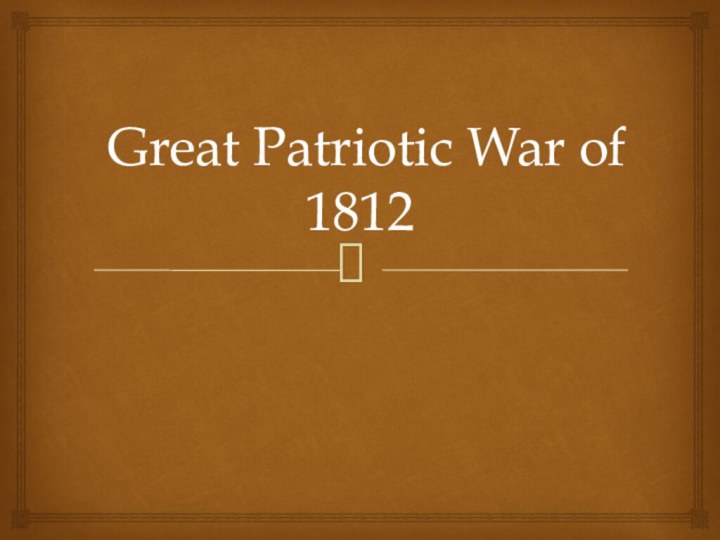
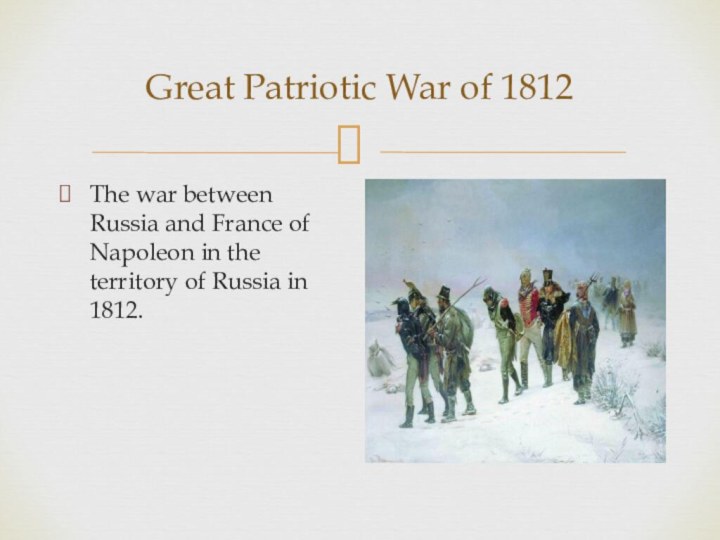
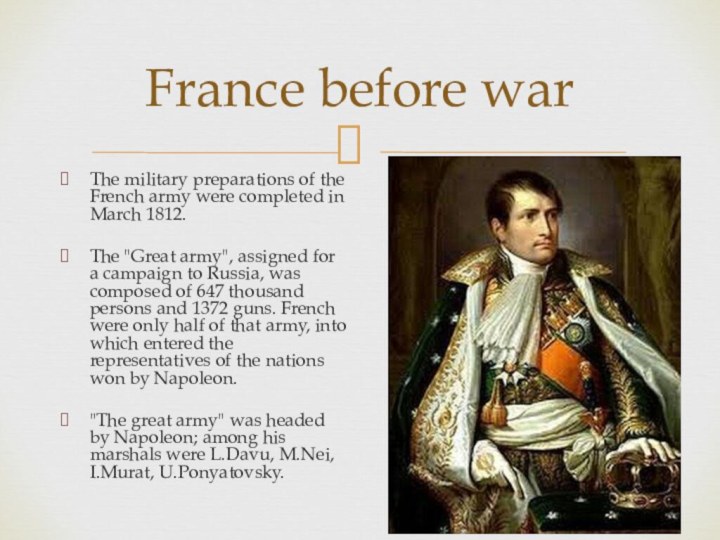
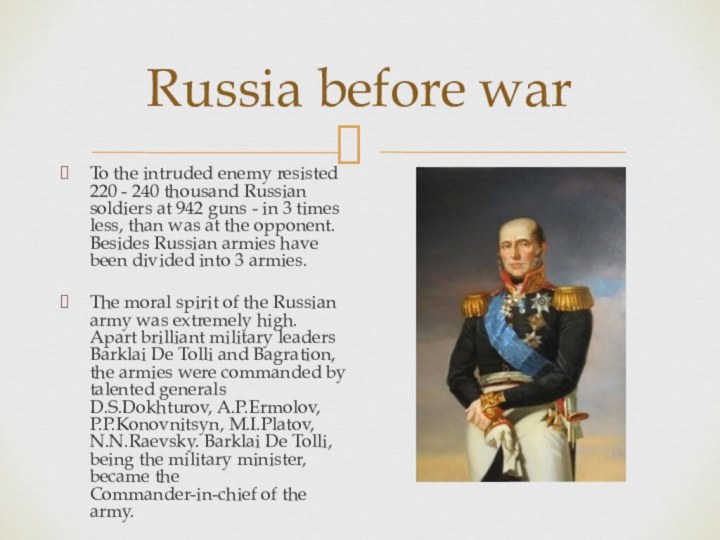
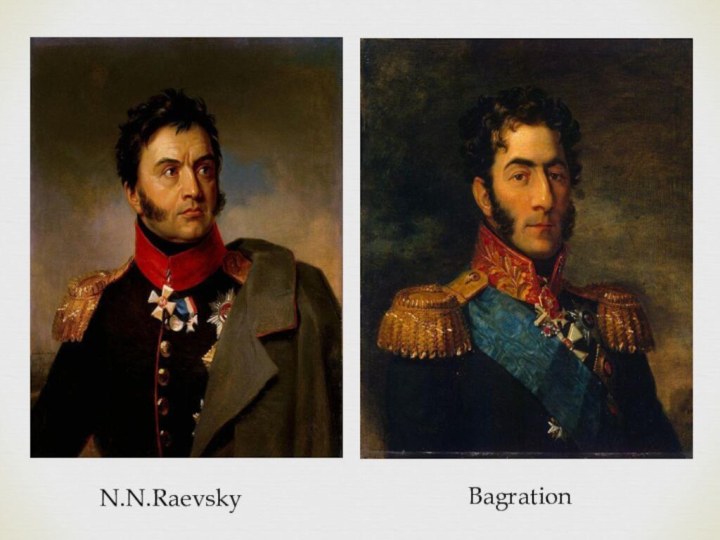

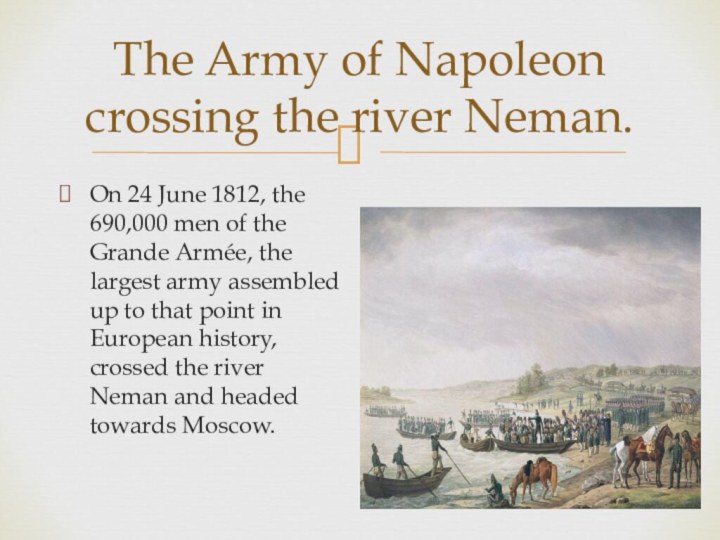


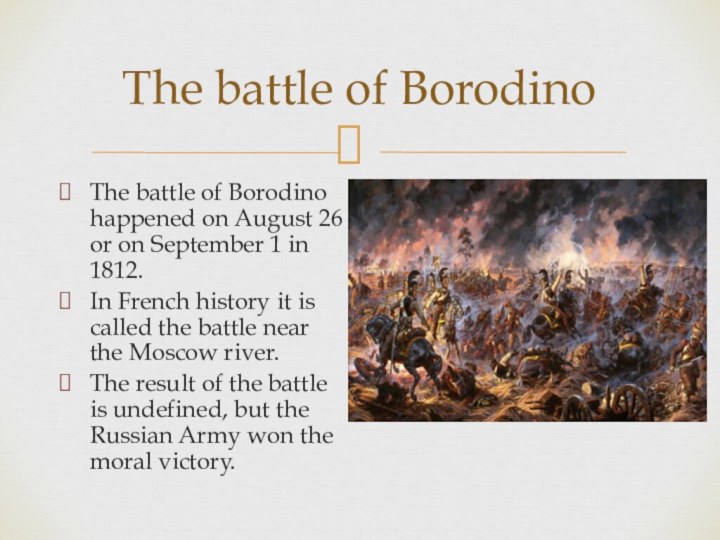
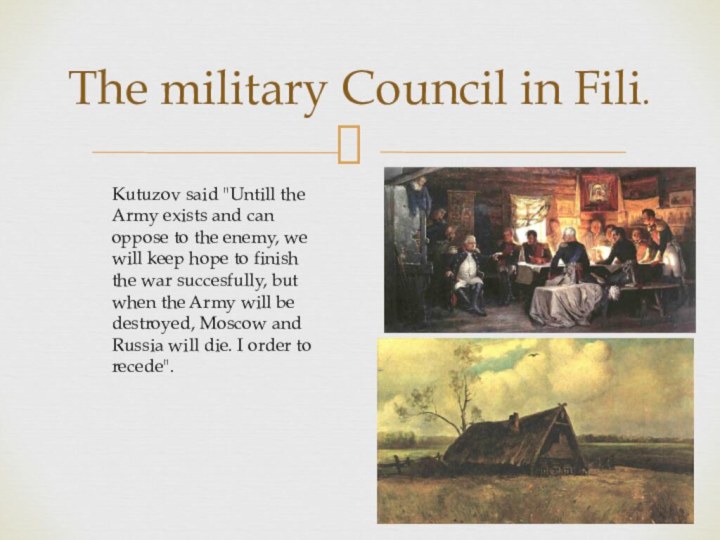
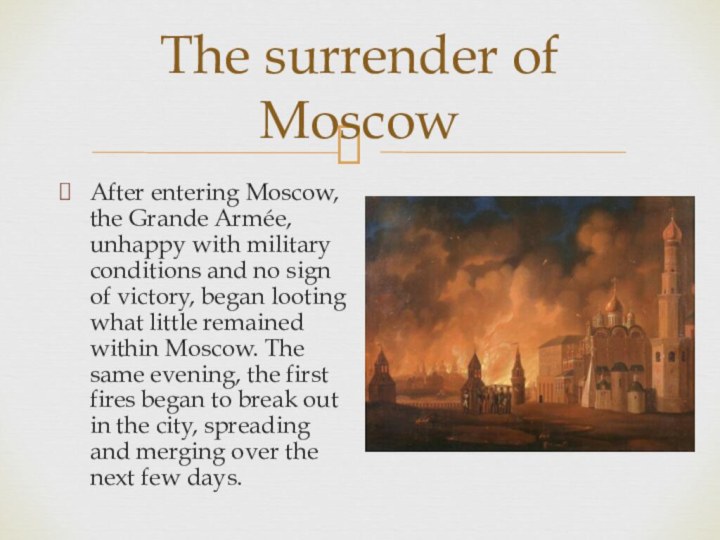
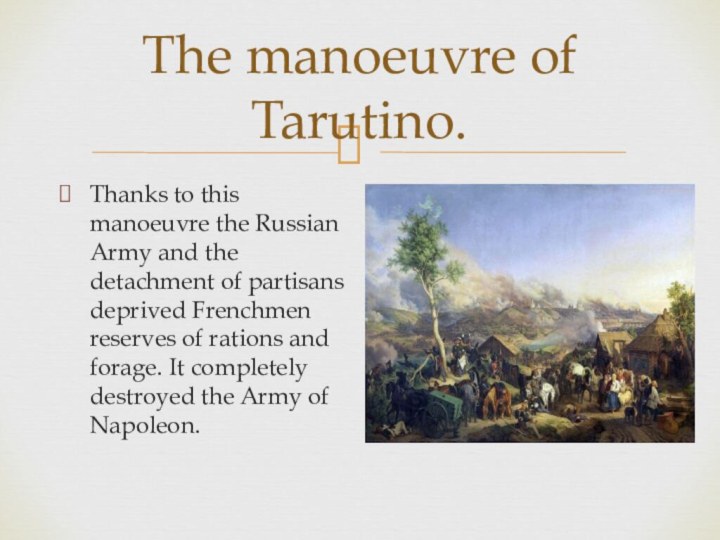
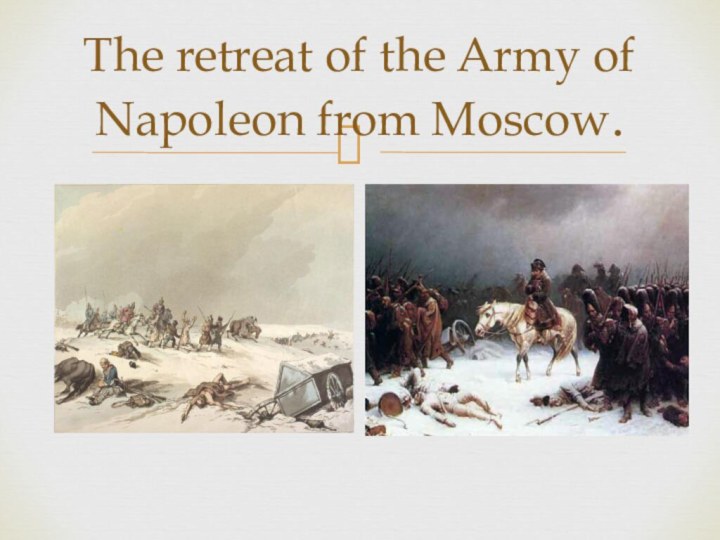
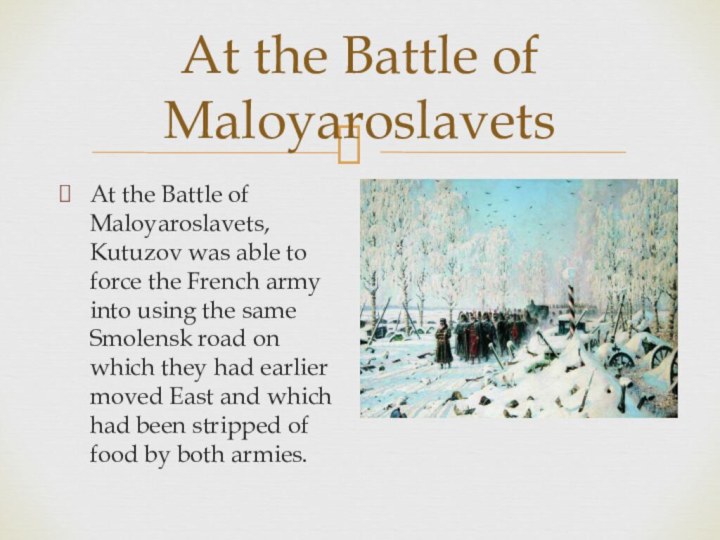
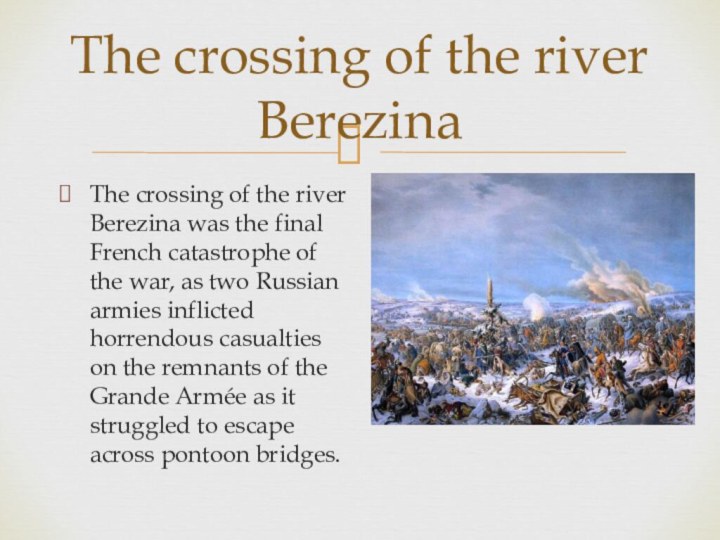
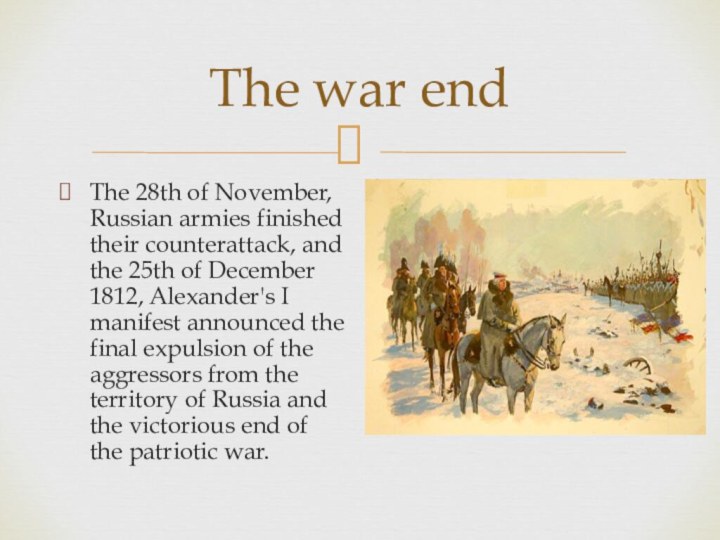
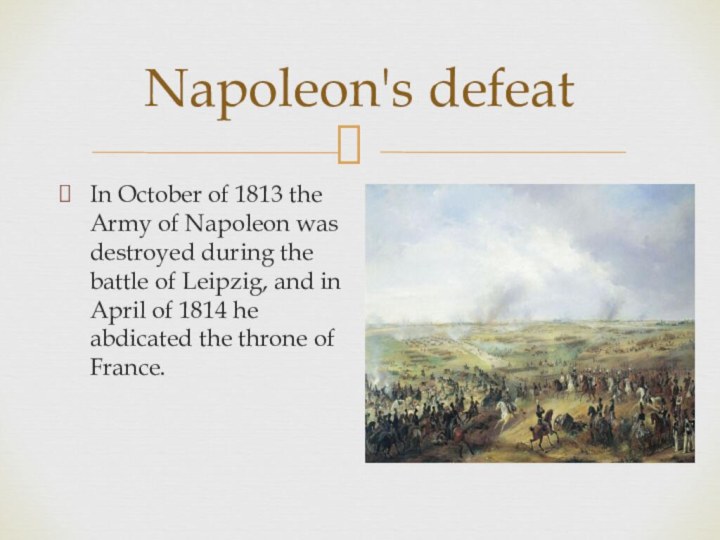

Слайд 3
France before war
The military preparations of the French
army were completed in March 1812.
The "Great army",
assigned for a campaign to Russia, was composed of 647 thousand persons and 1372 guns. French were only half of that army, into which entered the representatives of the nations won by Napoleon. "The great army" was headed by Napoleon; among his marshals were L.Davu, M.Nei, I.Murat, U.Ponyatovsky.
Слайд 4
Russia before war
To the intruded enemy resisted 220
- 240 thousand Russian soldiers at 942 guns -
in 3 times less, than was at the opponent. Besides Russian armies have been divided into 3 armies.The moral spirit of the Russian army was extremely high. Apart brilliant military leaders Barklai De Tolli and Bagration, the armies were commanded by talented generals D.S.Dokhturov, A.P.Ermolov, P.P.Konovnitsyn, M.I.Platov, N.N.Raevsky. Barklai De Tolli, being the military minister, became the Commander-in-chief of the army.
Слайд 6
War reasons
Russia refused to support continental blockade against
England.
Napoleon wish to grasp the world.
In 1811 Napoleon said
to his Ambassador in Warsaw: "In 5 years I will rule all the world. Only Russia remains, I will destroy it..."
Слайд 7
The Army of Napoleon crossing the river Neman.
On
24 June 1812, the 690,000 men of the Grande
Armée, the largest army assembled up to that point in European history, crossed the river Neman and headed towards Moscow.
Слайд 8
The battle of Smolensk (1812)
Political pressure on Barclay
to give battle and the general's continuing resistance led
to his removal from the position of commander-in-chief to be replaced by the boastful and popular Mikhail Illarionovich Kutuzov. Despite Kutuzov's rhetoric to the contrary, he continued in much the way Barclay had, immediately seeing that to face the French in open battle would be to sacrifice his army pointlessly. Following an indecisive clash at Smolensk on August 16–18, he finally managed to establish a defensive position at Borodino.Слайд 9 The unsatisfaction due to the long retreat and
the growing mistrust of Barklai De Tolli in the
army and generally in the Russian society forced the emperor, the 8th of August, to appoint as commander-in-chief M.I.Kutuzov, an experienced and cautious commander.Kutuzov started the preparation for the decisive battle, for which the Russian army receded at the position near the village of Borodino, in 110 versts from Moscow. There, on the 26th of August (the 7th of September) took place the battle that played the important role in war.
Слайд 10
The battle of Borodino
The battle of Borodino
happened on August 26 or on September 1 in
1812.In French history it is called the battle near the Moscow river.
The result of the battle is undefined, but the Russian Army won the moral victory.





























